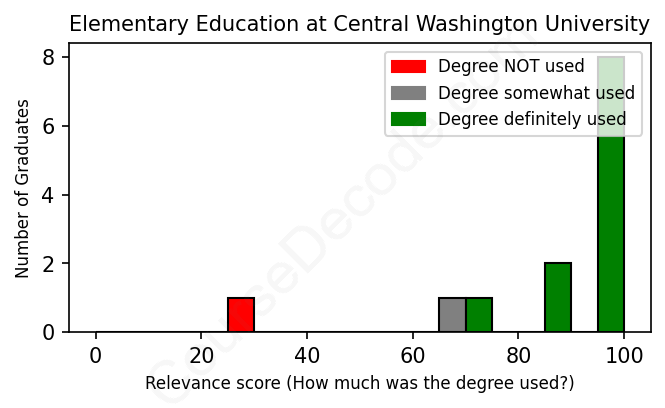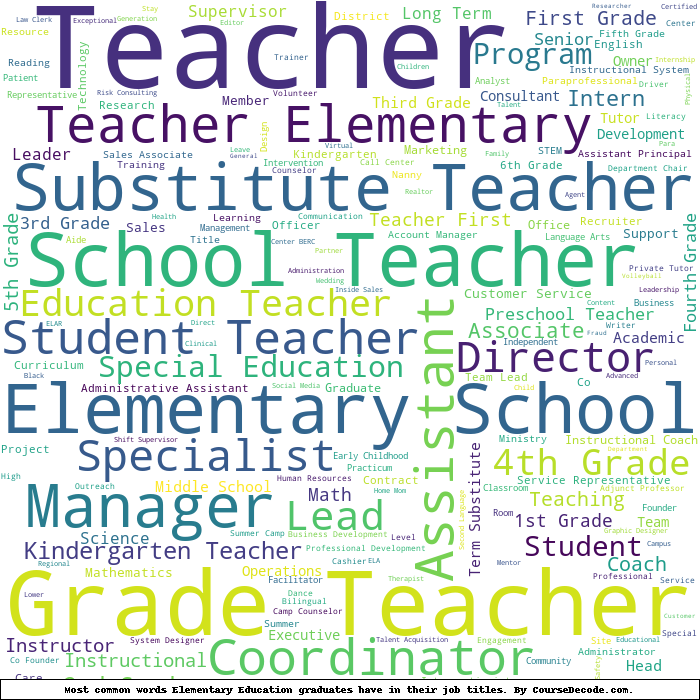
First, some facts. Of the Elementary Education graduates from Central Washington University we've analyzed , here's how many have used (or NOT used) their degree in their career:

These are estimates based on AI analysis of 13 LinkedIn profiles (see below).
The verdict? Significantly above average. Overall, with an average relevance score of 87%, Elementary Education graduates from Central Washington University have a much higher likelihood (+20%) of finding work in this field compared to the average graduate across all fields:
And for comparison, here's the chart for all profiles we've looked at across all degrees.
Also, after graduating, only 23% of these graduates have pursued further education other than another Bachelor's degree (such as a Masters degree or other), compared to the average across all profiles of 35%. This suggests a Bachelors degree is enough for most Elementary Education graduates, and it's normal to look for work straight after graduation.
See the details:
|
Relevance score: 100% We think this person has gone into a career highly relevant to their degree. We think this person has gone into a career highly relevant to their degree.
DEGREE INFOGraduated in 2017 from Central Washington University with a Bachelor's degree in Elementary Education. Also pursued further education since (see below). JOB HISTORY SINCE GRADUATIONFirst Grade Teacher St. Louise Parish School Aug 2017 - Jun 2021 FURTHER DEGREES DONE SINCE GRADUATINGMaster of Education - MEdAmerican College of Education 2018 - 2021 ABOUTHello! My name is [NAME REMOVED] Helfen and I have been in education since 2014. I have an Associate's Degree in Elementary Education from Highline College. In 2015, I began my dual-major degree in Elementary Education and Early Childhood Education at Central Washington University where I graduated Magna Cum Laude in 2017. During my student teaching, I had the opportunity to travel to Macau, China to teach Kindergarten. After graduation, I began a teaching job at St. Louise School in Bellevue, Washington. At this school, I led as co-chair of the Social Studies Committee and participated in teaching summer camps. |
The top 10 most common jobs done by the graduates we've analyzed (ranked most common to least) are:
When looking at the jobs held by graduates from Central Washington University with degrees in Elementary Education, it's pretty clear that many of these folks are working directly in fields related to education. A significant number have taken on roles like Elementary School Teachers, Substitute Teachers, or other positions where they actively engage with students and apply their teaching skills. For example, many have gone on to teach in various school districts, working with different age groups and even subject areas like art. These roles are the most relevant to their degrees and showcase a strong commitment to applying their educational training in meaningful ways.
On the flip side, there are also graduates who have pursued careers outside of traditional teaching roles. Some have ventured into various administrative or operational jobs, like marketing or data analysis, which don't really tap into the skills they honed during their education studies. While they may have gained some valuable skills along the way, these positions don't make the most of their background in Elementary Education. Overall, it's a mixed bag—most grads do find jobs that are relevant to what they studied, but there are definitely some who have strayed into unrelated fields.
Here is a visual representation of the most common words in job titles for Elementary Education graduates (this is across all Elementary Education graduates we've analyzed, not just those who went to Central Washington University):

Looking at the career trajectories of graduates from Central Washington University who studied Elementary Education, it seems like many of them start out in pretty standard teaching positions right after graduation. Most of them land their first jobs as teachers, substitute teachers, or in some kind of educational role. This is a solid start for those looking to get hands-on experience in the field. Over the first few years, many stick with teaching, often moving from one school district to another as they seek out better opportunities or experience. It's common to see them in roles where they have an impact on younger students, which aligns perfectly with their degrees.
However, as we look further into their careers, not everyone stays within the realm of education. For instance, some graduates have shifted to roles that are less directly connected to teaching, like marketing or customer service positions, which can be a bit surprising considering the focus of their studies. Some have found success in educational administration or specific teaching roles, while others have taken turns into completely different areas, like data analysis or marketing. It's a mixed bag after about five to ten years; while many stick with teaching, it seems like those who venture out into other fields may not have directly related careers in education. Overall, there are definitely some solid career paths in teaching, but the variation suggests that not every graduate is finding a direct connection to their degree down the line.
Getting a Bachelor’s degree in Elementary Education at Central Washington University isn’t the easiest thing ever, but it’s also not the hardest—you know? It definitely has its challenging moments, especially when you dive into subjects like child development, curriculum design, and classroom management. You’ll need to juggle classes, assignments, and maybe even some hands-on teaching experiences, but most students find the material pretty engaging, especially if you have a passion for working with kids. There are definitely easier degrees out there, but if you're committed and stay organized, it's definitely manageable!
Most commonly, in the LinkedIn profiles we've looked at, it takes people 2 years to finish a Bachelor degree in Elementary Education.
So, here's the lowdown on these Central Washington University grads: most of them have primarily stuck to teaching jobs, which is pretty common for education majors. While being a teacher generally offers decent job stability and benefits, the pay can vary widely depending on the district and level of experience. For many, especially those who started with substitute teaching or short-term gigs, it might take a while to build up to a good salary. A few of them have transitioned into roles outside of just traditional teaching, like data analyst positions, which might pay better, especially if they’ve got some strong skills to back that up. Overall, it looks like they’re doing okay, but if you're shooting for big bucks right out of college, teaching might not be the quickest route there.
Here is a visual representation of the most common words seen in the "about" section of LinkedIn profiles who have a Bachelor degree in Elementary Education (this is across all Elementary Education graduates we've analyzed, not just those who went to Central Washington University). This may or may not be useful:

Here are all colleges offering a Bachelor degree in Elementary Education (ordered by the average relevance score of their Elementary Education graduates, best to worst) where we have analyzed at least 10 of their graduates: